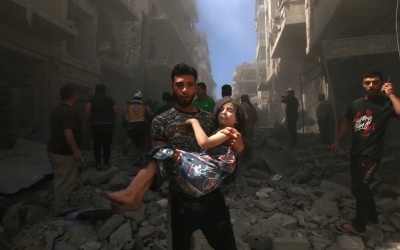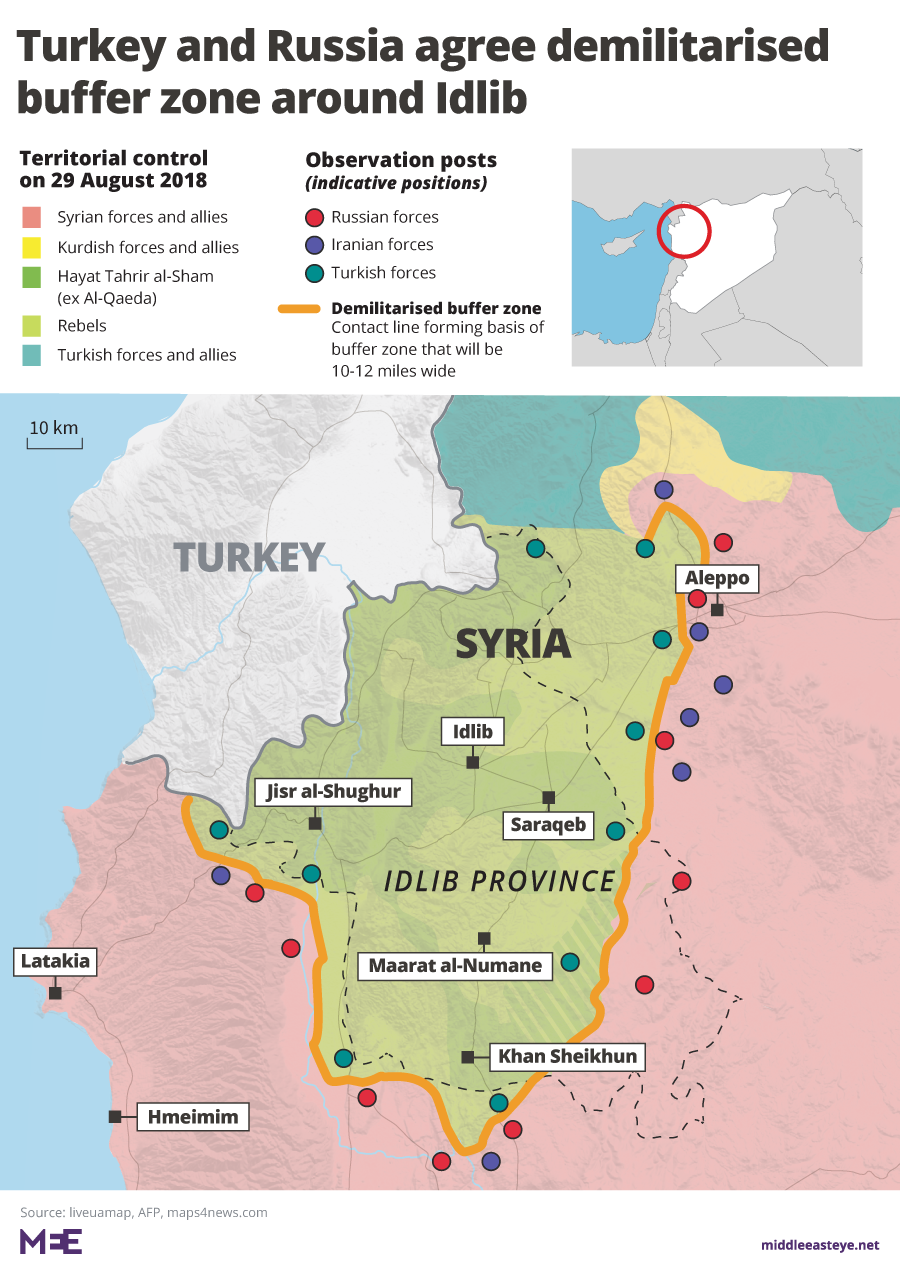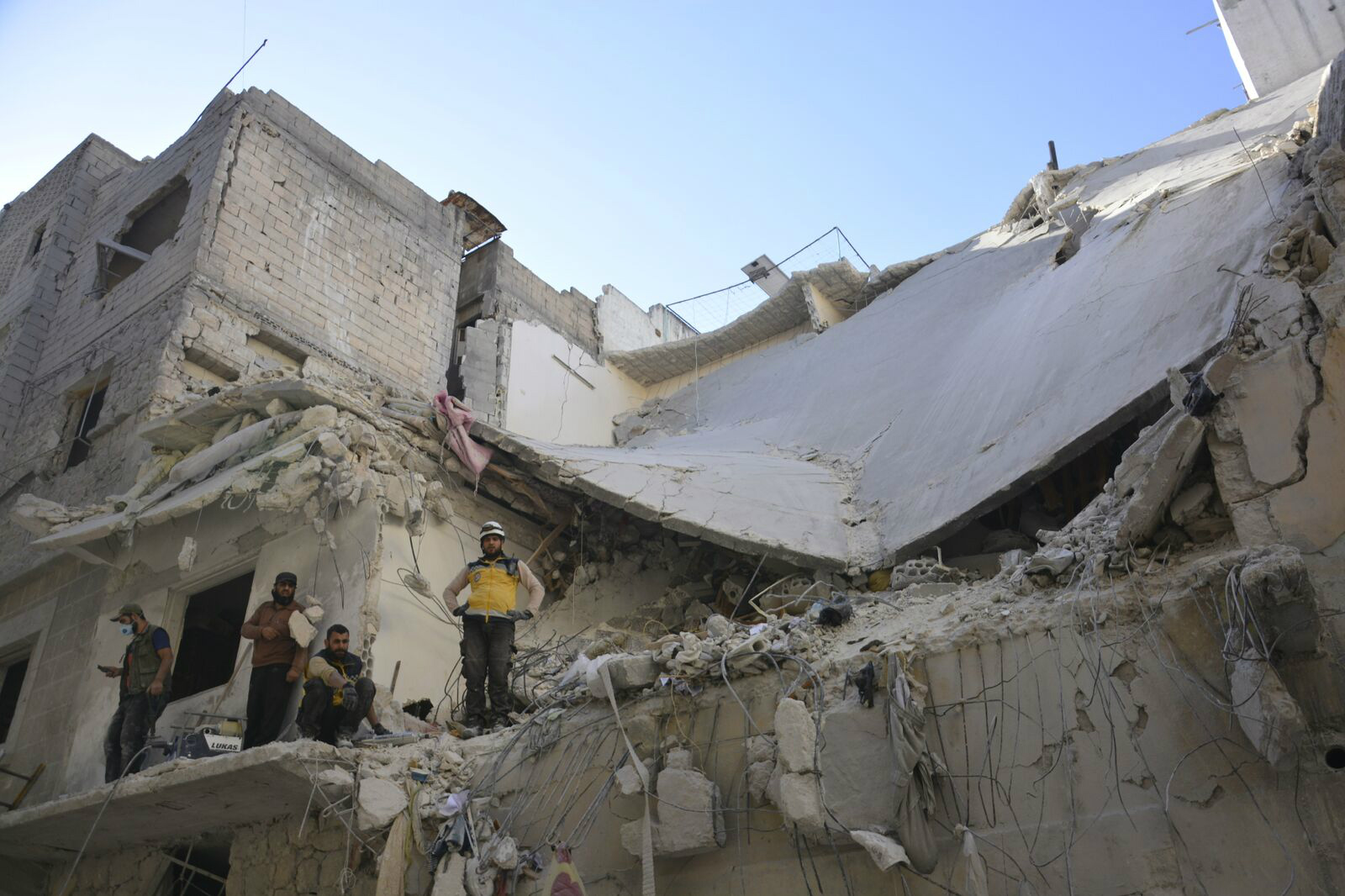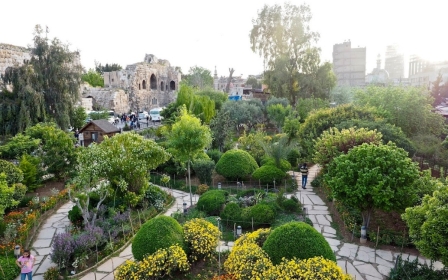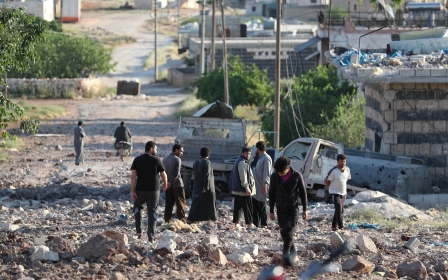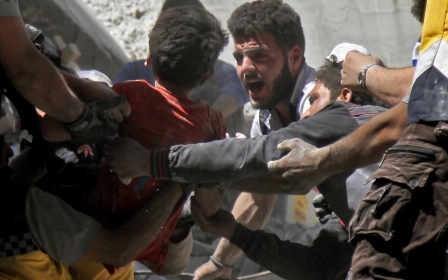Turkey fears being backed into a corner as Russia and Assad press Idlib attack

As pro-Syrian government forces press their offensive against Syria’s rebel-held north, Turkish officials have been desperately attempting to convince Damascus’s ally Russia into calling a halt to the attack - with no success.
Now, Turkish sources tell Middle East Eye, Ankara worries that its fraught relationship with Moscow appears to be unravelling, and a cease-fire is far from being secured.
Wary of losing ground and political leverage as a result, Syrian opposition-backer Turkey last week delivered shipments of heavy weapons to rebel groups, opposition sources have told MEE.
Turkish-backed rebel groups have also been deployed to the hottest fronts, in an attempt to stop Syrian government forces and their Russian ally from making further headway into rebel-held Idlib province.
The offensive poses difficult questions for Turkey, which thought it had kept a lid on Syrian President Bashar al-Assad’s designs on conquering the last rebel redoubt through an agreement signed in Sochi with Russia in September.
Since April, however, Assad’s forces have gained ground in Idlib province’s south and northern Hama.
And rather than keeping Damascus in check, as the Sochi agreement promised, Russia has joined Syrian government forces in their offensive, contributing to the bombardment that has seen some 300,000 civilians displaced and scores killed.
Moscow’s justification, Turkish officials have told MEE, is that Ankara has failed to properly rid the deconfliction zone surrounding the rebel enclave of militant groups such as Hay’at Tahrir al-Sham (HTS), which is led by al-Qaeda’s former Syrian branch.
“Russians use the existence of Hay’at Tahrir al-Sham in Idlib as a pretext to attack. They claim the implementation of the agreement to remove them from the area dragged on too long,” a Turkish official told MEE on condition of anonymity.
“They believe Turkish observation stations granted a safety net for the armed opposition and facilitated their recovery.”
Russia, the official said, is trying to pressure Turkey on the ground to force concessions from it in the ongoing Syrian political settlement talks that are being held intermittently in the Kazakh capital of Astana.
According to the United Nations, some three million people have been cornered in Idlib and its environs, the majority of them displaced from elsewhere by conflict.
Turkey already hosts more than three million Syrian refugees and has closed its borders to more in an attempt to keep a lid on the crisis.
“They know that refugees are our soft spot. We don’t want to see loss of life and we cannot afford a new refugee crisis. However, we still maintain our regular channels with Russians and political discussions are ongoing," the official said.
Playing politics
Turkish officials believe Russia has been playing the same strategy all along.
Ankara believes Moscow is militarily pushing Turkey to the edge in order to gain the upper hand in the Astana negotiations, where Turkey, Iran and Russia are discussing the makeup of a committee to draft a new Syrian constitution.
“The regime is in a very bad condition, both militarily and economically. They are afraid of losing the political window of opportunity,” the official said.
'The regime is in a very bad condition, both militarily and economically. They are afraid of losing the political window of opportunity'
- Turkish official
A fuel shortage crisis, along with harsh economic conditions in Assad-held territories brought about by severe international sanctions, have angered and frustrated many Syrians who have stood with the president through the civil war.
Meanwhile, a rebel counteroffensive in northern Hama province has exposed Assad’s forces as vulnerable.
Syrian opposition sources agree with the Turkish assessment that Russia would like to strip Turkey of its cards in negotiations. Yet they don’t believe Moscow is simply looking for a political solution.
“Russia never believed in the political track,” Labib al-Nahhas, a Syrian opposition politican formerly attached to the Ahrar al-Sham militant group, told MEE.
“An attack against Idlib wasn’t feasible last year due to the readiness of the armed groups and Iranian unwillingness to support the attack, as well as the failure of Russian infiltration in opposition-held areas. They wanted to convince locals to accept reconciliation deals similar to ones signed in Damascus and Daraa.”
Nahhas said the Russians think they need an urgent breakthrough, as political negotiations have ground to a halt and the Syrian government struggles economically.
“They would like to inflict massive damage on the civilian areas, causing displacement and putting pressure on civilians and the armed groups to surrender,” he said.
There has been a lot of speculation about other reasons for the Turkish-Russian disagreement in Idlib.
Some analysts have suggested that the pressure in northern Syria could be part of a greater strategy to show Ankara that it cannot step back from its purchase of a Russian-made S-400 air defence system, which has created a major crisis between Turkey and its NATO ally the US.
Sources, however, dismissed this notion.
“S-400s aren’t tied to this issue at all,” the Turkish official said. “Some other people also claimed that this was all about [Turkey] annexing [northern Syria’s] Tall Rifaat by ceding territory in Idlib. They are wrong.”
A Senior Syrian opposition source, speaking anonymously, told MEE that Turkish officials see Idlib as essential to its national security.
“Without controlling Idlib, it would be almost impossible to secure Turkish-controlled Afrin and enclaves along the border,” the source said.
The source also said Turkish officials weren't directly blaming Russian officials but only the Syrian government in televised comments because they still want to keep channels with Moscow open.
Where is Washington?
The US role continues to be important.
Last year, strongly worded statements by President Donald Trump against an Idlib offensive helped Ankara convince Russia to ink the Sochi agreement. This time, however, the US seems less engaging.
“The United States continues to be alarmed by ongoing Russian and regime air strikes in northwest Syria. The violence must end. We will continue to highlight publicly and in diplomatic channels the dangerous effects of these acts,” the US State Department said in a statement on Tuesday.
A Reuters report, referencing a western intelligence source claimed that Washington had permitted Turkey-backed opposition forces to be handed anti-tank missiles it had supplied and which had been in storage.
Both Syrian opposition sources and Turkish officials denied the account.
“The Americans brought everything back to the US. They didn’t leave anything behind. The TOW missiles in use were distributed years ago,” another anonymous Turkish official told MEE.
A Syrian opposition source believes there is no solution in Idlib other than Russia signing a deal with HTS leader Abu Mohammed al-Jolani that would allow Russian military presence in southern Idlib.
“Another solution might be the Russians and Turkey agreeing upon a humanitarian zone near the border. But these are all speculation,” the source said.
Others believe it is still too early to tell what will happen in Idlib.
Hasan Basri Yalcin, director for strategic research at conservative Turkish think tank SETA, said Russia would have to think about the broader ties it has with Turkey when it comes to Idlib.
“If Russia has figured out what to do in Idlib, they could have taken it long ago,” he told MEE.
“They still need Turkish support. At the end of the day, they don’t want to harm the relationship they have developed with Ankara. It is in many ways more important than controlling Idlib.”
This article is available in French on Middle East Eye French edition.
Middle East Eye propose une couverture et une analyse indépendantes et incomparables du Moyen-Orient, de l’Afrique du Nord et d’autres régions du monde. Pour en savoir plus sur la reprise de ce contenu et les frais qui s’appliquent, veuillez remplir ce formulaire [en anglais]. Pour en savoir plus sur MEE, cliquez ici [en anglais].


